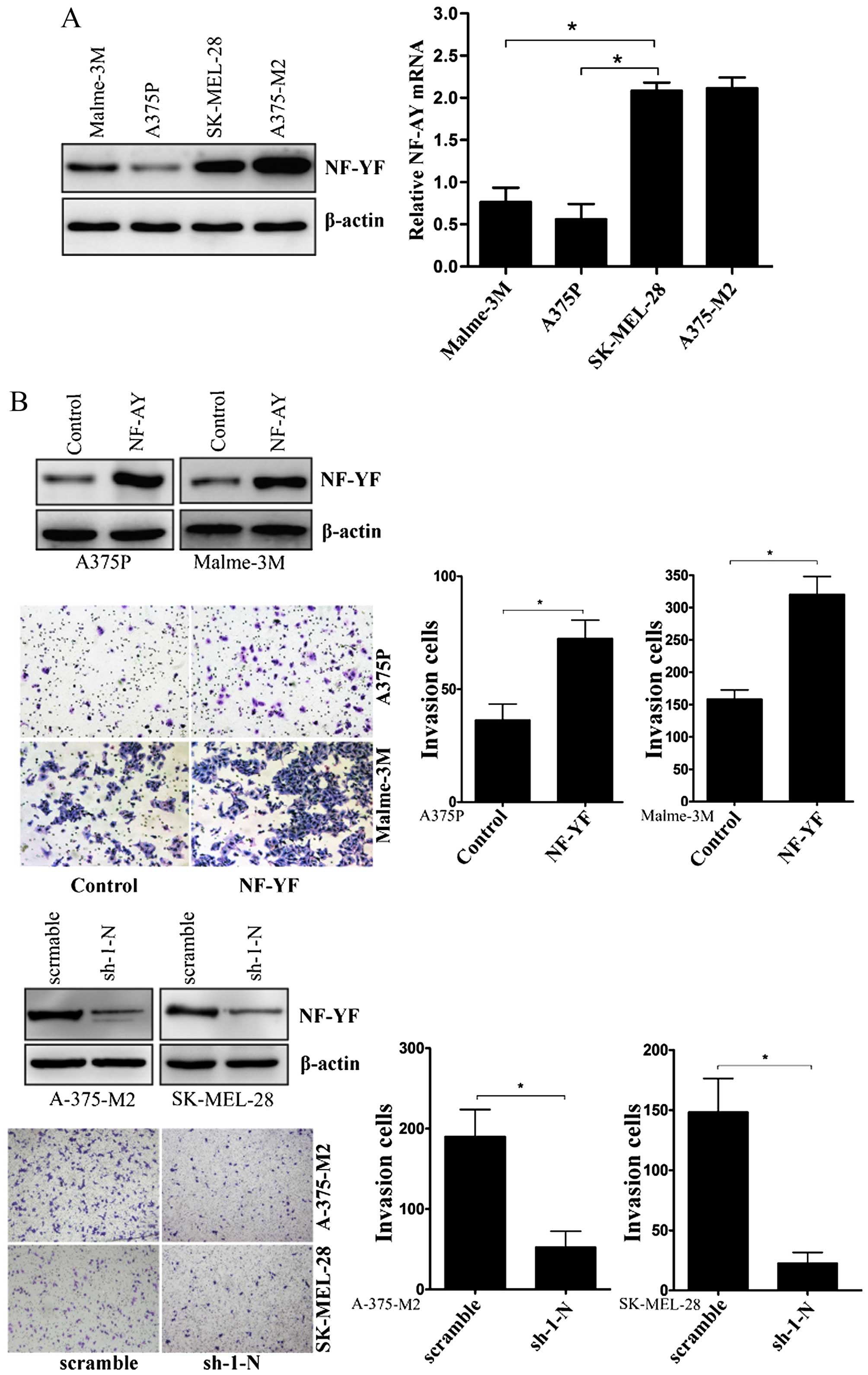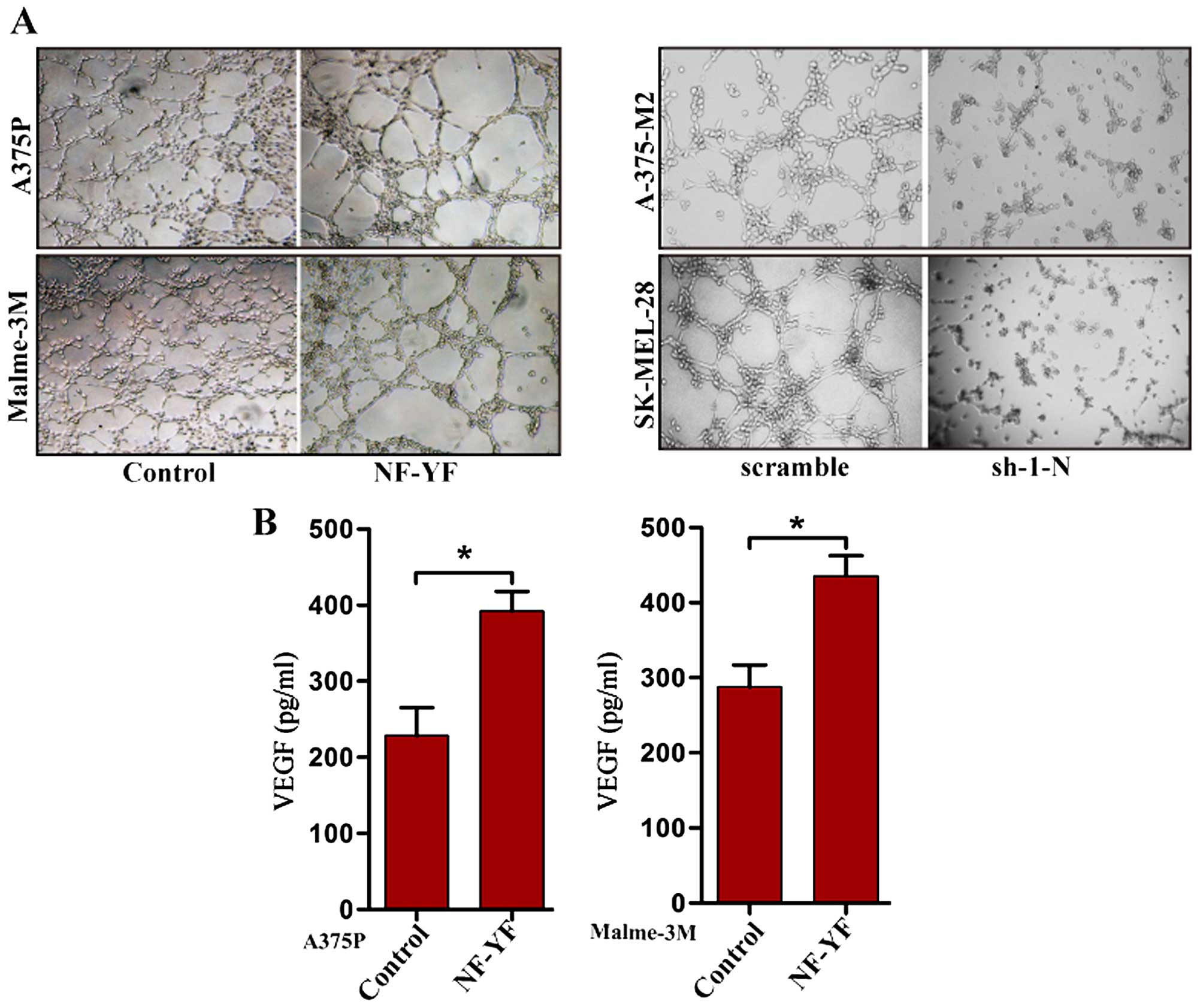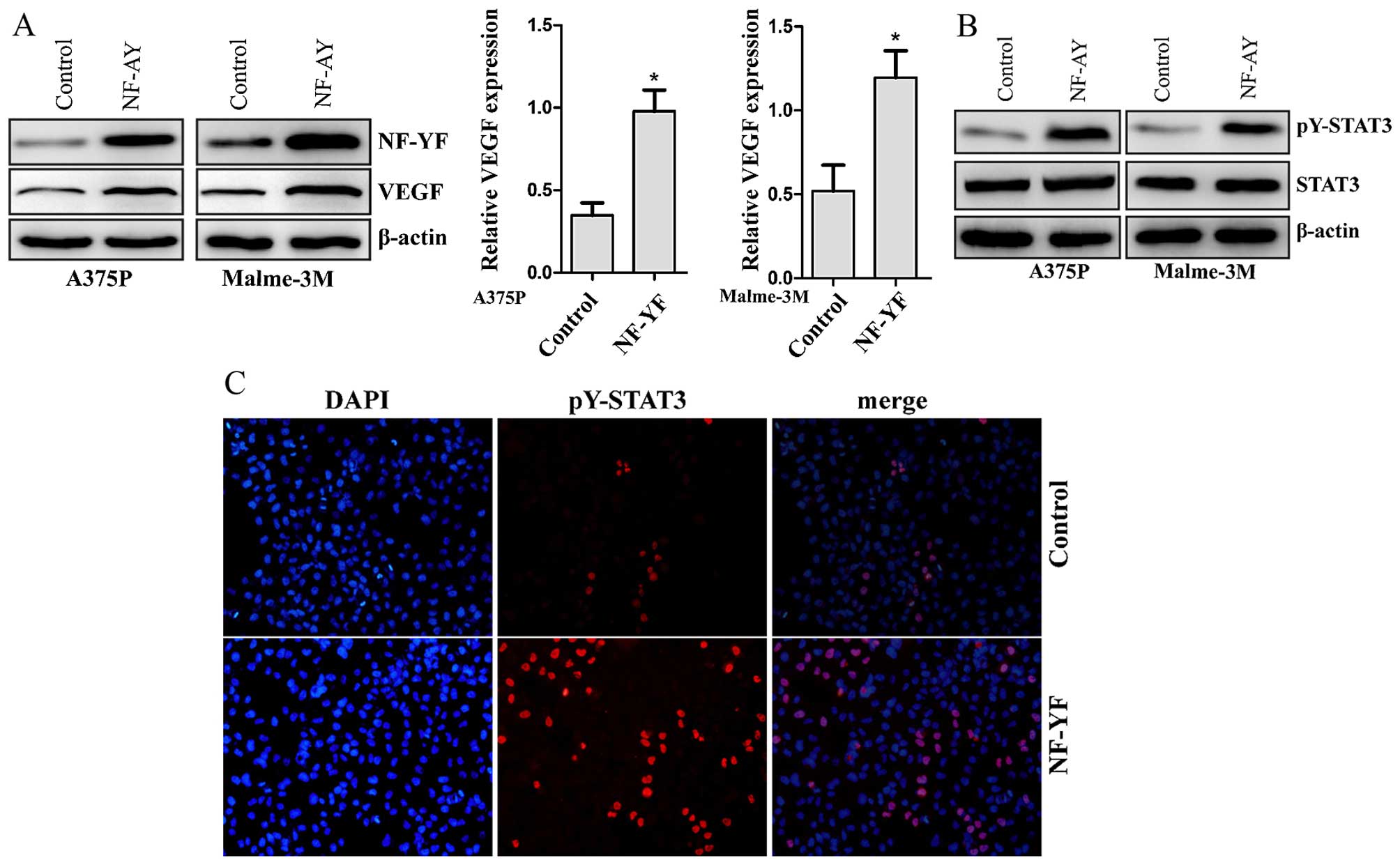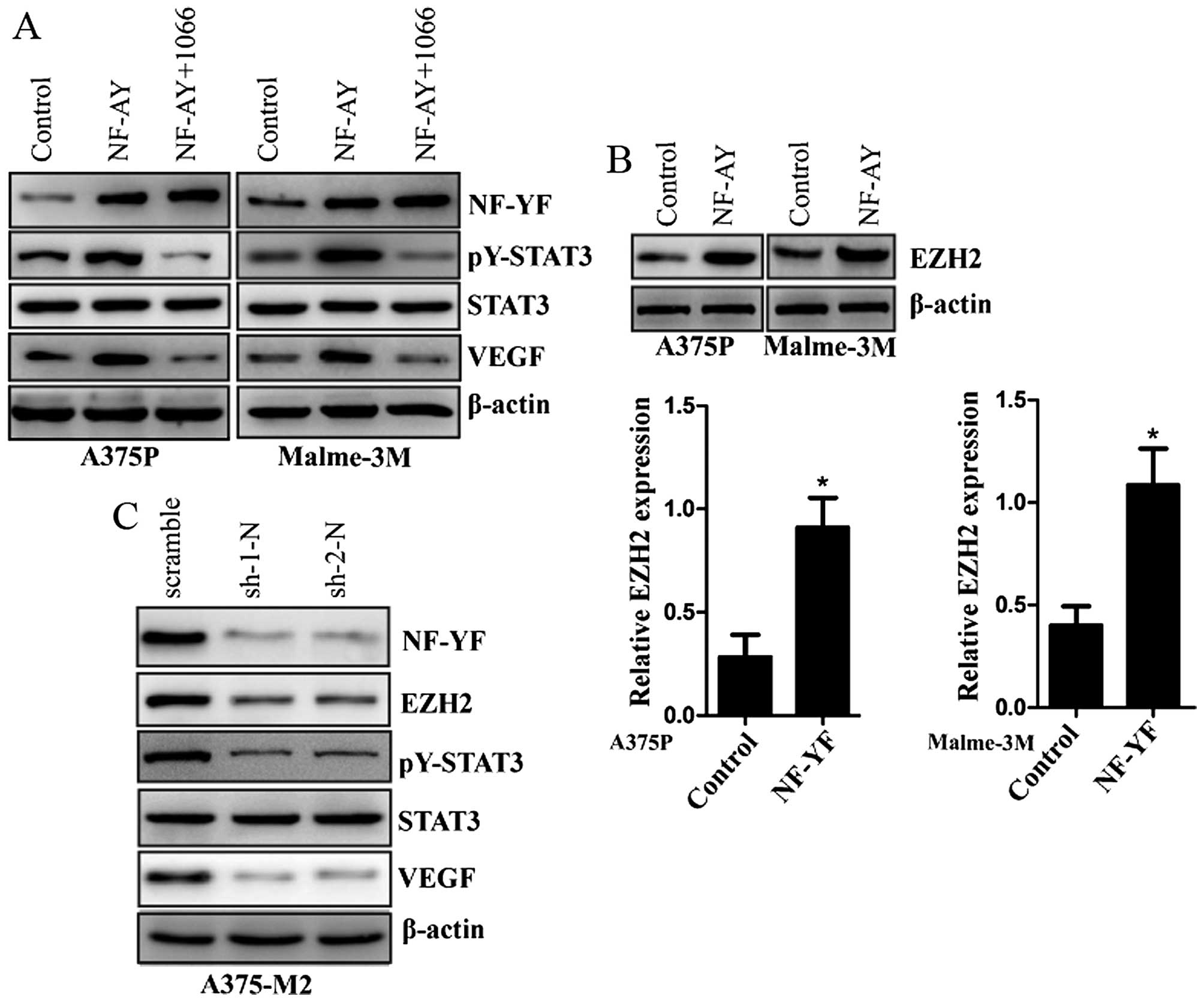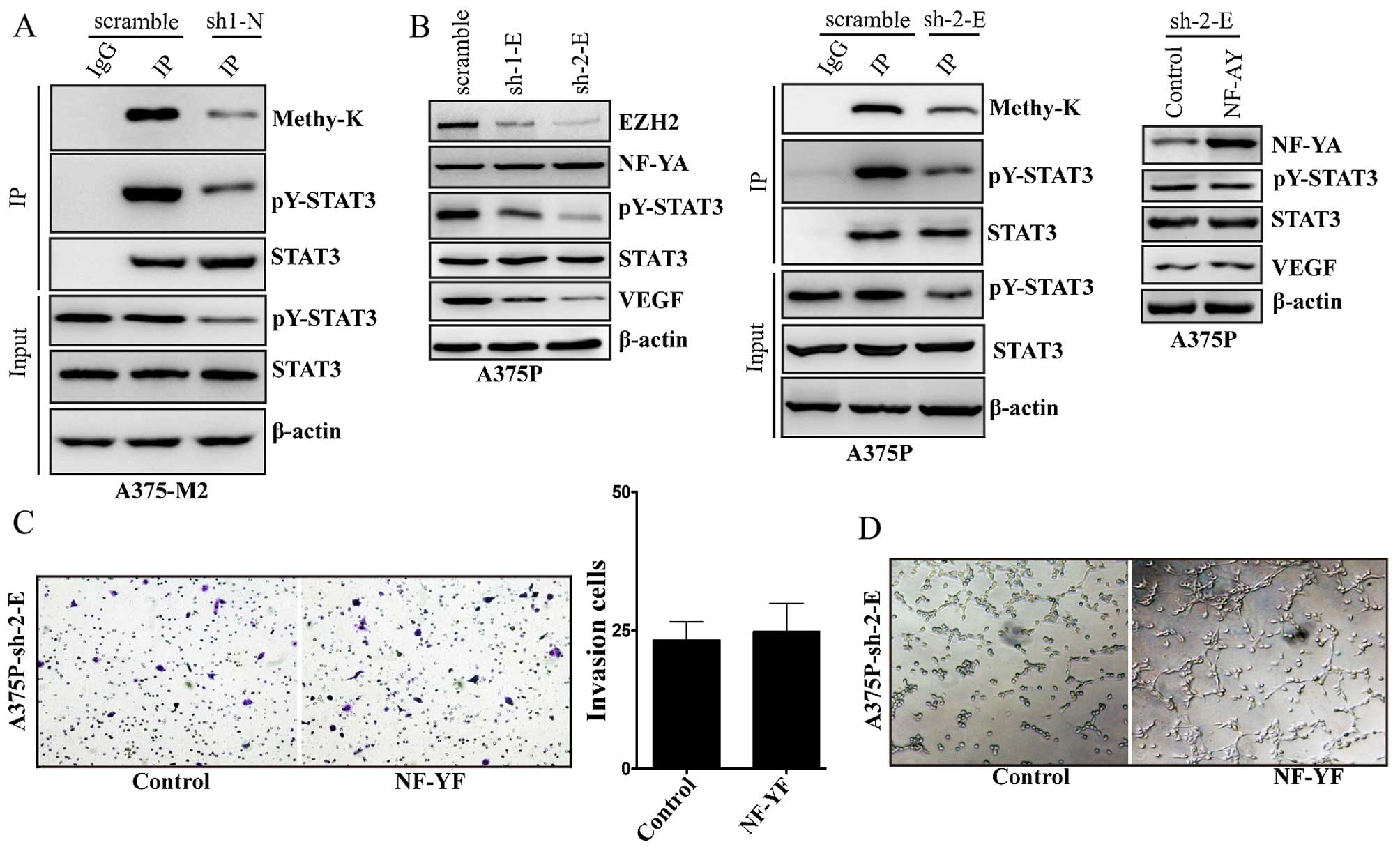|
1
|
Tas F: Metastatic behavior in melanoma:
Timing, pattern, survival, and influencing factors. J Oncol.
2012:6476842012. View Article : Google Scholar : PubMed/NCBI
|
|
2
|
Geller AC, Clapp RW, Sober AJ, Gonsalves
L, Mueller L, Christiansen CL, Shaikh W and Miller DR: Melanoma
epidemic: An analysis of six decades of data from the Connecticut
Tumor Registry. J Clin Oncol. 31:417–4178. 2013. View Article : Google Scholar
|
|
3
|
Mehlen P and Puisieux A: Metastasis: A
question of life or death. Nat Rev Cancer. 6:449–458. 2006.
View Article : Google Scholar : PubMed/NCBI
|
|
4
|
Lamalice L, Le Boeuf F and Huot J:
Endothelial cell migration during angiogenesis. Circ Res.
100:782–794. 2007. View Article : Google Scholar : PubMed/NCBI
|
|
5
|
Schaafhausen MK, Yang WJ, Centanin L,
Wittbrodt J, Bosserhoff A, Fischer A, Schartl M and Meierjohann S:
Tumor angiogenesis is caused by single melanoma cells in a manner
dependent on reactive oxygen species and NF-κB. J Cell Sci.
126:3862–3872. 2013. View Article : Google Scholar : PubMed/NCBI
|
|
6
|
Ellis LM and Hicklin DJ: VEGF-targeted
therapy: Mechanisms of anti-tumour activity. Nat Rev Cancer.
8:579–591. 2008. View
Article : Google Scholar : PubMed/NCBI
|
|
7
|
Welti J, Loges S, Dimmeler S and Carmeliet
P: Recent molecular discoveries in angiogenesis and antiangiogenic
therapies in cancer. J Clin Invest. 123:3190–3200. 2013. View Article : Google Scholar : PubMed/NCBI
|
|
8
|
Jia X, Hong Q, Lei L, Li D, Li J, Mo M,
Wang Y, Shao Z, Shen Z, Cheng J, et al: Basal and therapy-driven
hypoxia-inducible factor-1α confers resistance to endocrine therapy
in estrogen receptor-positive breast cancer. Oncotarget.
6:8648–8662. 2015. View Article : Google Scholar : PubMed/NCBI
|
|
9
|
Yeh JJ and Kim WY: Targeting tumor hypoxia
with hypoxia-activated prodrugs. J Clin Oncol. 33:1505–1508. 2015.
View Article : Google Scholar : PubMed/NCBI
|
|
10
|
Cao D, Zhou H, Zhao J, Jin L, Yu W, Yan H,
Hu Y and Guo T: PGC-1α integrates glucose metabolism and
angiogenesis in multiple myeloma cells by regulating VEGF and
GLUT-4. Oncol Rep. 31:1205–1210. 2014.PubMed/NCBI
|
|
11
|
Zhang C, Li Y, Cornelia R, Swisher S and
Kim H: Regulation of VEGF expression by HIF-1α in the femoral head
cartilage following ischemia osteonecrosis. Sci Rep. 2:6502012.
View Article : Google Scholar
|
|
12
|
Wei LH, Kuo ML, Chen CA, Chou CH, Lai KB,
Lee CN and Hsieh CY: Interleukin-6 promotes cervical tumor growth
by VEGF-dependent angiogenesis via a STAT3 pathway. Oncogene.
22:1517–1527. 2003. View Article : Google Scholar : PubMed/NCBI
|
|
13
|
Kimura H, Weisz A, Kurashima Y, Hashimoto
K, Ogura T, D'Acquisto F, Addeo R, Makuuchi M and Esumi H: Hypoxia
response element of the human vascular endothelial growth factor
gene mediates transcriptional regulation by nitric oxide: Control
of hypoxia-inducible factor-1 activity by nitric oxide. Blood.
95:189–197. 2000.
|
|
14
|
Levy DE and Darnell JE Jr: Stats:
Transcriptional control and biological impact. Nat Rev Mol Cell
Biol. 3:651–662. 2002. View
Article : Google Scholar : PubMed/NCBI
|
|
15
|
Zhuang S: Regulation of STAT signaling by
acetylation. Cell Signal. 25:1924–1931. 2013. View Article : Google Scholar : PubMed/NCBI
|
|
16
|
Mora LB, Buettner R, Seigne J, Diaz J,
Ahmad N, Garcia R, Bowman T, Falcone R, Fairclough R, Cantor A, et
al: Constitutive activation of Stat3 in human prostate tumors and
cell lines: Direct inhibition of Stat3 signaling induces apoptosis
of prostate cancer cells. Cancer Res. 62:6659–6666. 2002.PubMed/NCBI
|
|
17
|
Niu G, Wright KL, Huang M, Song L, Haura
E, Turkson J, Zhang S, Wang T, Sinibaldi D, Coppola D, et al:
Constitutive Stat3 activity up-regulates VEGF expression and tumor
angiogenesis. Oncogene. 21:2000–2008. 2002. View Article : Google Scholar : PubMed/NCBI
|
|
18
|
Rao RA, Dhele N, Cheemadan S, Ketkar A,
Jayandharan GR, Palakodeti D and Rampalli S: Ezh2 mediated H3K27me3
activity facilitates somatic transition during human pluripotent
reprogramming. Sci Rep. 5:82292015. View Article : Google Scholar : PubMed/NCBI
|
|
19
|
Caganova M, Carrisi C, Varano G, Mainoldi
F, Zanardi F, Germain PL, George L, Alberghini F, Ferrarini L,
Talukder AK, et al: Germinal center dysregulation by histone
methyltransferase EZH2 promotes lymphomagenesis. J Clin Invest.
123:5009–5022. 2013. View
Article : Google Scholar : PubMed/NCBI
|
|
20
|
Lee JM, Lee JS, Kim H, Kim K, Park H, Kim
JY, Lee SH, Kim IS, Kim J, Lee M, et al: EZH2 generates a methyl
degron that is recognized by the DCAF1/DDB1/CUL4 E3 ubiquitin
ligase complex. Mol Cell. 48:572–586. 2012. View Article : Google Scholar : PubMed/NCBI
|
|
21
|
Gunawan M, Venkatesan N, Loh JT, Wong JF,
Berger H, Neo WH, Li LY, La Win MK, Yau YH, Guo T, et al: The
methyltransferase Ezh2 controls cell adhesion and migration through
direct methylation of the extranuclear regulatory protein talin.
Nat Immunol. 16:505–516. 2015. View
Article : Google Scholar : PubMed/NCBI
|
|
22
|
Tong Q, He S, Xie F, Mochizuki K, Liu Y,
Mochizuki I, Meng L, Sun H, Zhang Y, Guo Y, et al: Ezh2 regulates
transcriptional and posttranslational expression of T-bet and
promotes Th1 cell responses mediating aplastic anemia in mice. J
Immunol. 192:5012–5022. 2014. View Article : Google Scholar : PubMed/NCBI
|
|
23
|
Kim E, Kim M, Woo DH, Shin Y, Shin J,
Chang N, Oh YT, Kim H, Rheey J, Nakano I, et al: Phosphorylation of
EZH2 activates STAT3 signaling via STAT3 methylation and promotes
tumorigenicity of glioblastoma stem-like cells. Cancer Cell.
23:839–852. 2013. View Article : Google Scholar : PubMed/NCBI
|
|
24
|
Domashenko AD, Wiener S and Emerson SG:
NF-Ya protein delivery as a tool for hematopoietic progenitor cell
expansion. Methods Mol Biol. 916:303–316. 2012. View Article : Google Scholar : PubMed/NCBI
|
|
25
|
Lin YC, Chen YN, Lin KF, Wang FF, Chou TY
and Chen MY: Association of p21 with NF-YA suppresses the
expression of Polo-like kinase 1 and prevents mitotic death in
response to DNA damage. Cell Death Dis. 5:e9872014. View Article : Google Scholar : PubMed/NCBI
|
|
26
|
Domashenko AD, Danet-Desnoyers G, Aron A,
Carroll MP and Emerson SG: TAT-mediated transduction of NF-Ya
peptide induces the ex vivo proliferation and engraftment potential
of human hematopoietic progenitor cells. Blood. 116:2676–2683.
2010. View Article : Google Scholar : PubMed/NCBI
|
|
27
|
Jin S, Fan F, Fan W, Zhao H, Tong T,
Blanck P, Alomo I, Rajasekaran B and Zhan Q: Transcription factors
Oct-1 and NF-YA regulate the p53-independent induction of the
GADD45 following DNA damage. Oncogene. 20:2683–2690. 2001.
View Article : Google Scholar : PubMed/NCBI
|
|
28
|
Matuoka K and Chen KY: Possible role of
subunit A of nuclear factor Y (NF-YA) in normal human diploid
fibroblasts during senescence. Biogerontology. 1:261–271. 2000.
View Article : Google Scholar
|
|
29
|
Orgaz JL, Pandya P, Dalmeida R,
Karagiannis P, Sanchez-Laorden B, Viros A, Albrengues J, Nestle FO,
Ridley AJ, Gaggioli C, et al: Diverse matrix metalloproteinase
functions regulate cancer amoeboid migration. Nat Commun.
5:42552014. View Article : Google Scholar : PubMed/NCBI
|
|
30
|
Eustace AJ, Crown J, Clynes M and
O'Donovan N: Preclinical evaluation of dasatinib, a potent Src
kinase inhibitor, in melanoma cell lines. J Transl Med. 6:532008.
View Article : Google Scholar : PubMed/NCBI
|
|
31
|
Herraiz C, Calvo F, Pandya P, Cantelli G,
Rodriguez-Hernandez I, Orgaz JL, Kang N, Chu T, Sahai E and
Sanz-Moreno V: Reactivation of p53 by a cytoskeletal sensor to
control the balance between DNA damage and tumor dissemination. J
Natl Cancer Inst. 108:pii: djv289. 2015.PubMed/NCBI
|
|
32
|
Judd LM, Menheniott TR, Ling H, Jackson
CB, Howlett M, Kalantzis A, Priebe W and Giraud AS: Inhibition of
the JAK2/STAT3 pathway reduces gastric cancer growth in vitro and
in vivo. PLoS One. 9:e959932014. View Article : Google Scholar : PubMed/NCBI
|
|
33
|
Zhou X, Ren Y, Liu A, Han L, Zhang K, Li
S, Li P, Li P, Kang C, Wang X, et al: STAT3 inhibitor WP1066
attenuates miRNA-21 to suppress human oral squamous cell carcinoma
growth in vitro and in vivo. Oncol Rep. 31:2173–2180.
2014.PubMed/NCBI
|
|
34
|
Garipov A, Li H, Bitler BG, Thapa RJ,
Balachandran S and Zhang R: NF-YA underlies EZH2 upregulation and
is essential for proliferation of human epithelial ovarian cancer
cells. Mol Cancer Res. 11:360–369. 2013. View Article : Google Scholar : PubMed/NCBI
|
|
35
|
Nishida N, Yano H, Nishida T, Kamura T and
Kojiro M: Angiogenesis in cancer. Vasc Health Risk Manag.
2:213–219. 2006. View Article : Google Scholar
|
|
36
|
Xue Y, Lim S, Yang Y, Wang Z, Jensen LD,
Hedlund EM, Andersson P, Sasahara M, Larsson O, Galter D, et al:
PDGF-BB modulates hematopoiesis and tumor angiogenesis by inducing
erythropoietin production in stromal cells. Nat Med. 18:100–110.
2011. View
Article : Google Scholar : PubMed/NCBI
|
|
37
|
Mahabeleshwar GH and Byzova TV:
Angiogenesis in melanoma. Semin Oncol. 34:555–565. 2007. View Article : Google Scholar : PubMed/NCBI
|
|
38
|
Shibuya M: Vascular endothelial growth
factor (VEGF) and its receptor (VEGFR) signaling in angiogenesis: A
crucial target for anti- and proangiogenic therapies. Genes Cancer.
2:1097–1105. 2011. View Article : Google Scholar
|
|
39
|
Detmar M: Tumor angiogenesis. J Investig
Dermatol Symp Proc. 5:20–23. 2000. View Article : Google Scholar
|















